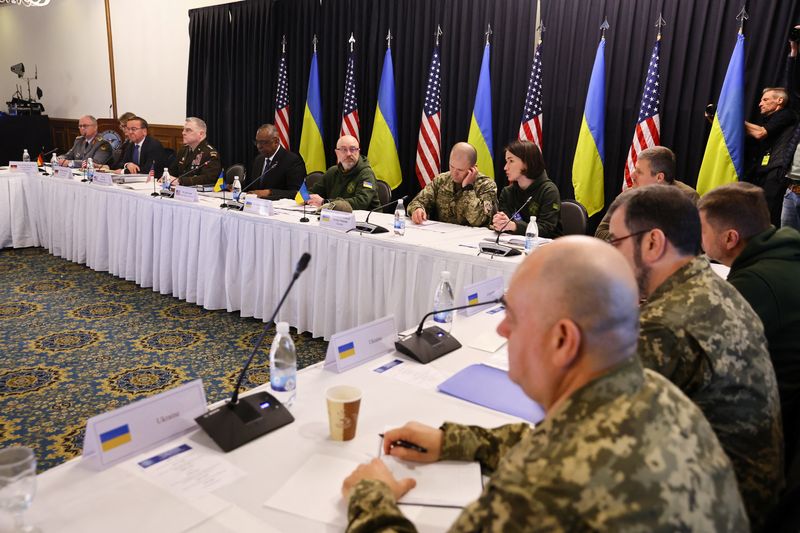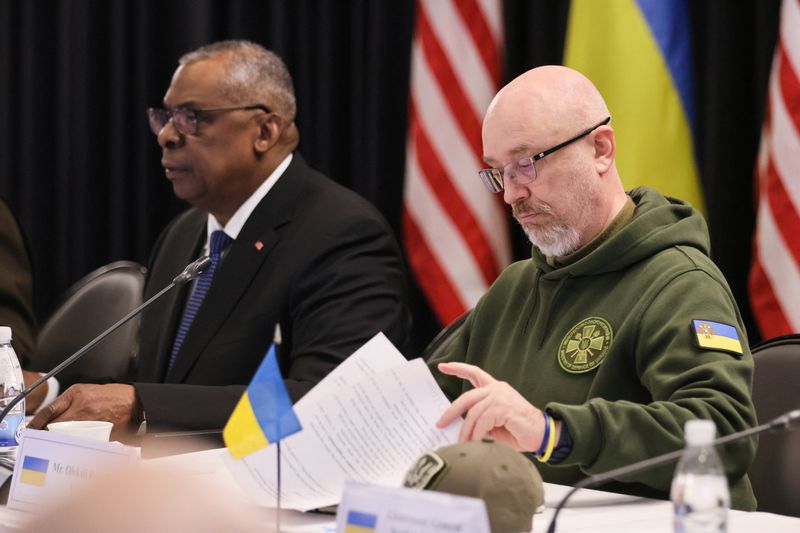By Idrees Ali and Sabine Siebold
RAMSTEIN AIR BASE, Germany (Reuters) -The United States and its allies failed during talks in Germany to convince Berlin to provide its Leopard battle tanks to Ukraine, a key demand from Kyiv as it tries to breath new momentum into its fight against Russian forces.
As protesters in Berlin called on their government to provide the tanks, the talks among military leaders at Ramstein Air Base ended without any such agreement.
Berlin said it would move quickly to allow allies to transfer Leopards in their own arsenals to Ukraine, if a consensus was found. But even that appeared to be inconclusive.
As the talks concluded, Ukraine's President Volodymyr Zelenskiy acknowledged Kyiv will have to keep fighting to ensure it has enough heavy armour. But he said the Ramstein meeting, which ended with billions of dollars in commitments, would strengthen Ukraine's resilience.
"Yes, we will still have to fight for the delivery of modern tanks, but every day we make it more obvious that there is no alternative to taking a decision about tanks," he said.
Chancellor Olaf Scholz, whose Social Democrat party is traditionally deeply sceptical of military involvements and wary of sudden moves that could cause Moscow to escalate further in Ukraine, insists Germany will only move in concert with allies, a position echoed by new defence minister Boris Pistorius.
"There are good reasons for the (tank) deliveries and there are good reasons against, and in view of the entire situation of a war that has been ongoing for almost one year, all pros and cons must be weighed very carefully," he said, without elaborating on the reasons.
"There clearly is no unified view. The impression that has occasionally arisen, that there is a closed coalition and Germany was standing in the way, this impression is wrong."
He said Germany would start preparing tanks so they were ready to go if allies did agree to send them. It was unclear whether any country other than Germany opposes the move.
Ahead of the meeting, proponents of sending tanks had hoped that recent moves such as Britain's decision to send 14 of its main battle tanks would open the door for Germany to make similar moves.
U.S. Defence Secretary Lloyd Austin said Ukraine was well-equipped even without the Leopards. The United States announced a new package of $2.5 billion in military aid ahead of Friday's talks, including Stryker (NYSE:SYK) armoured personnel carriers and more Bradley fighting vehicles.
"Ukraine is not dependent on a single platform," Austin told a news conference at Ramstein.
At the White House, National Security Council spokesperson John Kirby (NYSE:KEX) denied there was any "arm-twisting" of Germany.
"These are sovereign decisions. We respect them," Kirby said.
"The Leopard tank is a terrific system - very, very modern, very effective. And so I think we've been nothing but clear, privately and publicly, with Germany and all our allies and partners that if you can meet a need that the Ukrainians have, then, you know, we obviously want to see you do that."
As Ukraine gears up for an expected intensification of the fighting in the coming months, General Mark Milley, chairman of the U.S. Joint Chiefs of Staff, cautioned about the limits of Ukraine's military to force out all Russian forces.
"From a military standpoint for this year it would be very difficult to expel all Russian forces from all bits of Russian-occupied Ukraine," Milley said.
Senior U.S. officials are advising Ukraine to hold off on launching a major offensive against Russian forces until the latest supply of U.S. weaponry is in place and training has been provided, a senior Biden administration official said on Friday.
Since the start of the war, Scholz's government has repeatedly expressed caution about sending Kyiv progressively more advanced weapons systems before eventually sending them anyway.
Ahead of the meeting, Polish and Lithuanian officials implied several countries might announce deliveries of tanks even without the German re-export permission they legally need, though there was no sign of this on Friday evening.
Earlier, Polish Prime Minister Mateusz Morawiecki said he was sceptical that any German approval would come since "the Germans are defending themselves against this like a devil protects himself against holy water."
Government sources in Germany have said it would move on the Leopard tanks issue if the United States agreed to send Abrams tanks to Ukraine, though a government spokesperson on Friday publicly contradicted that view. On Friday, Austin said there was no such linkage.

The United States argues that the Abrams would create a logistical headache for Ukrainian troops because the fuel and maintenance required would be so different from any other equipment they use.
The Kremlin's spokesman said Western countries supplying additional tanks to Ukraine would not change the course of the conflict and that they would add to the problems of the Ukrainian people.
